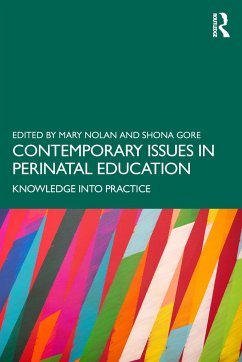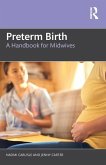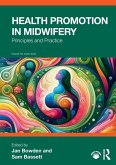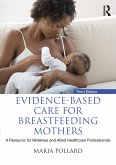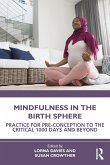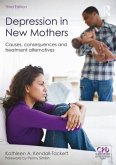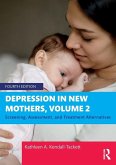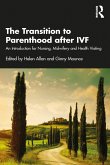Contemporary Issues in Perinatal Education
Knowledge into Practice
Herausgeber: Nolan, Mary; Gore, Shona
Contemporary Issues in Perinatal Education
Knowledge into Practice
Herausgeber: Nolan, Mary; Gore, Shona
- Broschiertes Buch
- Merkliste
- Auf die Merkliste
- Bewerten Bewerten
- Teilen
- Produkt teilen
- Produkterinnerung
- Produkterinnerung
Providing essential knowledge and understanding that midwives, health visitors, nursery nurses and lay birth and early parenting educators need to deliver effective and evidence-based education to all new parents and families, this book explores key issues in perinatal education.
Andere Kunden interessierten sich auch für
![Preterm Birth Preterm Birth]() Naomi CarlislePreterm Birth55,99 €
Naomi CarlislePreterm Birth55,99 €![Health Promotion in Midwifery Health Promotion in Midwifery]() Health Promotion in Midwifery47,99 €
Health Promotion in Midwifery47,99 €![Evidence-based Care for Breastfeeding Mothers Evidence-based Care for Breastfeeding Mothers]() Maria Pollard (UK University of the West of Scotland)Evidence-based Care for Breastfeeding Mothers58,99 €
Maria Pollard (UK University of the West of Scotland)Evidence-based Care for Breastfeeding Mothers58,99 €![Mindfulness in the Birth Sphere Mindfulness in the Birth Sphere]() Mindfulness in the Birth Sphere51,99 €
Mindfulness in the Birth Sphere51,99 €![Depression in New Mothers Depression in New Mothers]() Kathleen Kendall-TackettDepression in New Mothers44,99 €
Kathleen Kendall-TackettDepression in New Mothers44,99 €![Depression in New Mothers, Volume 2 Depression in New Mothers, Volume 2]() Kathleen A. Kendall-TackettDepression in New Mothers, Volume 234,99 €
Kathleen A. Kendall-TackettDepression in New Mothers, Volume 234,99 €![The Transition to Parenthood after IVF The Transition to Parenthood after IVF]() Helen AllanThe Transition to Parenthood after IVF52,99 €
Helen AllanThe Transition to Parenthood after IVF52,99 €-
-
-
Providing essential knowledge and understanding that midwives, health visitors, nursery nurses and lay birth and early parenting educators need to deliver effective and evidence-based education to all new parents and families, this book explores key issues in perinatal education.
Produktdetails
- Produktdetails
- Verlag: Taylor & Francis Ltd
- Seitenzahl: 292
- Erscheinungstermin: 16. September 2022
- Englisch
- Abmessung: 234mm x 156mm x 16mm
- Gewicht: 450g
- ISBN-13: 9781032122519
- ISBN-10: 103212251X
- Artikelnr.: 64103647
- Herstellerkennzeichnung
- Libri GmbH
- Europaallee 1
- 36244 Bad Hersfeld
- gpsr@libri.de
- Verlag: Taylor & Francis Ltd
- Seitenzahl: 292
- Erscheinungstermin: 16. September 2022
- Englisch
- Abmessung: 234mm x 156mm x 16mm
- Gewicht: 450g
- ISBN-13: 9781032122519
- ISBN-10: 103212251X
- Artikelnr.: 64103647
- Herstellerkennzeichnung
- Libri GmbH
- Europaallee 1
- 36244 Bad Hersfeld
- gpsr@libri.de
Mary Nolan is well known for her work in perinatal education. She has published numerous articles and several books in the field, the most recent being Parent Education for the Critical 1000 Days. She has been Professor of Perinatal Education at the University of Worcester for 15 years and Honorary Professor at Nottingham University for 10 years. Prior to her University appointment, she worked as a birth and early parenting educator and trainer across the UK and in France, Belgium, Germany, Australia and New Zealand. In 2013, she was one of the founders of the International Journal of Birth and Parent Education and its first Editor-in-Chief. Shona Gore has facilitated antenatal and perinatal courses in the UK for those in the transition to parenthood during a 30-year career in childbirth education, relationship and birth education in schools (including for children with special learning needs) and workshops in adult education for NHS and Early Years' Practitioners. In association with the Universities of Bedfordshire and Worcester, she has devised and taught courses to train NCT practitioners from entrance to degree level. In 2013, with Mary Nolan (Editor-in-Chief), she founded the International Journal of Birth and Parent Education.
Part I: Preconception education 1.Preconception health, education and care:
The earliest intervention. 2.Improving health and well-being before,
between and beyond pregnancy. 3.Would you like to become pregnant in the
next year? The key question® initiative in the United States.
4.Breastfeeding promotion in early learning settings. Part II: Building
Parents' Relationships with their Infants from Pregnancy Onwards.
5.Stressed pre- birth? How the foetus is affected by a mother's state of
mind. 6.Commentary: Motherhood in conditions of war- Biological and
psychological routs to infant development. 7.Attachment: A play of
closeness and distance. 8.Just chatting with a baby is more than you might
think. 9.The musical key to babies' cognitive and social development.
10."Daddy's Funny!" Father's playfulness with young children. 11.Creative
play spaces: Finding the space for play. 12.Role of the parent-child
attachment relationship. 13.The transition to parenthood and early child
development in families with LGBTQ+ parents. Part III: Preparation for
Labour and Birth. 14.Commentary: A Mindful approach to childbirth education
and preparation for childbirth. 15.Preparing women for homebirth. 16.The
power to transform: Freeing women's instinctual potential for giving birth
through body-centred preparation in pregnancy. Part IV: Education and
Support for Parents of Twins. 17.Sleep patterns of twins. 18.Breastfeeding
twins. 19Helping parents understand and navigate the twin bond. Part V:
What parents need to know about sleeping, weaning, and the media.
20.Infant sleep and feeding in evolutionary perspective. 21.Sleep in early
childhood: The role of bedtime routines. 22.Food fussiness in early
childhood: Assessment and management. 23.Weaning a baby onto a vegan diet.
24.A Relationship-based framework for early childhood media use. Part VI:
The 'How' of education and supporting parents 25.Commentary: Tug of War-
Could polarised parenting advice cause harm? 26.Exploring the application
(or use) of educational theory in perinatal parenting through four
theorists. 27.Group intervention to treat fear of childbirth with
psycho-education and relaxation exercises. 28.Commentary- parenting
programmes are not culturally relevant to many communities. 29.Approachable
parenting: The five pillars of parenting pregnancy and beyond programme for
Muslim families. 30.Heteronormative obstacles in regular antenatal
education and the benefits of LGBTQ certified options: Experiences among
prospective LGBTQ parents in Sweden. 31.A psychodynamic approach to working
with pregnant teenagers and young parents. 32.Fathers prenatal
relationships with 'their' baby and 'her' pregnancy- implications for
antenatal education. 33.Tips for facilitating antenatal education online.
The earliest intervention. 2.Improving health and well-being before,
between and beyond pregnancy. 3.Would you like to become pregnant in the
next year? The key question® initiative in the United States.
4.Breastfeeding promotion in early learning settings. Part II: Building
Parents' Relationships with their Infants from Pregnancy Onwards.
5.Stressed pre- birth? How the foetus is affected by a mother's state of
mind. 6.Commentary: Motherhood in conditions of war- Biological and
psychological routs to infant development. 7.Attachment: A play of
closeness and distance. 8.Just chatting with a baby is more than you might
think. 9.The musical key to babies' cognitive and social development.
10."Daddy's Funny!" Father's playfulness with young children. 11.Creative
play spaces: Finding the space for play. 12.Role of the parent-child
attachment relationship. 13.The transition to parenthood and early child
development in families with LGBTQ+ parents. Part III: Preparation for
Labour and Birth. 14.Commentary: A Mindful approach to childbirth education
and preparation for childbirth. 15.Preparing women for homebirth. 16.The
power to transform: Freeing women's instinctual potential for giving birth
through body-centred preparation in pregnancy. Part IV: Education and
Support for Parents of Twins. 17.Sleep patterns of twins. 18.Breastfeeding
twins. 19Helping parents understand and navigate the twin bond. Part V:
What parents need to know about sleeping, weaning, and the media.
20.Infant sleep and feeding in evolutionary perspective. 21.Sleep in early
childhood: The role of bedtime routines. 22.Food fussiness in early
childhood: Assessment and management. 23.Weaning a baby onto a vegan diet.
24.A Relationship-based framework for early childhood media use. Part VI:
The 'How' of education and supporting parents 25.Commentary: Tug of War-
Could polarised parenting advice cause harm? 26.Exploring the application
(or use) of educational theory in perinatal parenting through four
theorists. 27.Group intervention to treat fear of childbirth with
psycho-education and relaxation exercises. 28.Commentary- parenting
programmes are not culturally relevant to many communities. 29.Approachable
parenting: The five pillars of parenting pregnancy and beyond programme for
Muslim families. 30.Heteronormative obstacles in regular antenatal
education and the benefits of LGBTQ certified options: Experiences among
prospective LGBTQ parents in Sweden. 31.A psychodynamic approach to working
with pregnant teenagers and young parents. 32.Fathers prenatal
relationships with 'their' baby and 'her' pregnancy- implications for
antenatal education. 33.Tips for facilitating antenatal education online.
Part I: Preconception education 1.Preconception health, education and care:
The earliest intervention. 2.Improving health and well-being before,
between and beyond pregnancy. 3.Would you like to become pregnant in the
next year? The key question® initiative in the United States.
4.Breastfeeding promotion in early learning settings. Part II: Building
Parents' Relationships with their Infants from Pregnancy Onwards.
5.Stressed pre- birth? How the foetus is affected by a mother's state of
mind. 6.Commentary: Motherhood in conditions of war- Biological and
psychological routs to infant development. 7.Attachment: A play of
closeness and distance. 8.Just chatting with a baby is more than you might
think. 9.The musical key to babies' cognitive and social development.
10."Daddy's Funny!" Father's playfulness with young children. 11.Creative
play spaces: Finding the space for play. 12.Role of the parent-child
attachment relationship. 13.The transition to parenthood and early child
development in families with LGBTQ+ parents. Part III: Preparation for
Labour and Birth. 14.Commentary: A Mindful approach to childbirth education
and preparation for childbirth. 15.Preparing women for homebirth. 16.The
power to transform: Freeing women's instinctual potential for giving birth
through body-centred preparation in pregnancy. Part IV: Education and
Support for Parents of Twins. 17.Sleep patterns of twins. 18.Breastfeeding
twins. 19Helping parents understand and navigate the twin bond. Part V:
What parents need to know about sleeping, weaning, and the media.
20.Infant sleep and feeding in evolutionary perspective. 21.Sleep in early
childhood: The role of bedtime routines. 22.Food fussiness in early
childhood: Assessment and management. 23.Weaning a baby onto a vegan diet.
24.A Relationship-based framework for early childhood media use. Part VI:
The 'How' of education and supporting parents 25.Commentary: Tug of War-
Could polarised parenting advice cause harm? 26.Exploring the application
(or use) of educational theory in perinatal parenting through four
theorists. 27.Group intervention to treat fear of childbirth with
psycho-education and relaxation exercises. 28.Commentary- parenting
programmes are not culturally relevant to many communities. 29.Approachable
parenting: The five pillars of parenting pregnancy and beyond programme for
Muslim families. 30.Heteronormative obstacles in regular antenatal
education and the benefits of LGBTQ certified options: Experiences among
prospective LGBTQ parents in Sweden. 31.A psychodynamic approach to working
with pregnant teenagers and young parents. 32.Fathers prenatal
relationships with 'their' baby and 'her' pregnancy- implications for
antenatal education. 33.Tips for facilitating antenatal education online.
The earliest intervention. 2.Improving health and well-being before,
between and beyond pregnancy. 3.Would you like to become pregnant in the
next year? The key question® initiative in the United States.
4.Breastfeeding promotion in early learning settings. Part II: Building
Parents' Relationships with their Infants from Pregnancy Onwards.
5.Stressed pre- birth? How the foetus is affected by a mother's state of
mind. 6.Commentary: Motherhood in conditions of war- Biological and
psychological routs to infant development. 7.Attachment: A play of
closeness and distance. 8.Just chatting with a baby is more than you might
think. 9.The musical key to babies' cognitive and social development.
10."Daddy's Funny!" Father's playfulness with young children. 11.Creative
play spaces: Finding the space for play. 12.Role of the parent-child
attachment relationship. 13.The transition to parenthood and early child
development in families with LGBTQ+ parents. Part III: Preparation for
Labour and Birth. 14.Commentary: A Mindful approach to childbirth education
and preparation for childbirth. 15.Preparing women for homebirth. 16.The
power to transform: Freeing women's instinctual potential for giving birth
through body-centred preparation in pregnancy. Part IV: Education and
Support for Parents of Twins. 17.Sleep patterns of twins. 18.Breastfeeding
twins. 19Helping parents understand and navigate the twin bond. Part V:
What parents need to know about sleeping, weaning, and the media.
20.Infant sleep and feeding in evolutionary perspective. 21.Sleep in early
childhood: The role of bedtime routines. 22.Food fussiness in early
childhood: Assessment and management. 23.Weaning a baby onto a vegan diet.
24.A Relationship-based framework for early childhood media use. Part VI:
The 'How' of education and supporting parents 25.Commentary: Tug of War-
Could polarised parenting advice cause harm? 26.Exploring the application
(or use) of educational theory in perinatal parenting through four
theorists. 27.Group intervention to treat fear of childbirth with
psycho-education and relaxation exercises. 28.Commentary- parenting
programmes are not culturally relevant to many communities. 29.Approachable
parenting: The five pillars of parenting pregnancy and beyond programme for
Muslim families. 30.Heteronormative obstacles in regular antenatal
education and the benefits of LGBTQ certified options: Experiences among
prospective LGBTQ parents in Sweden. 31.A psychodynamic approach to working
with pregnant teenagers and young parents. 32.Fathers prenatal
relationships with 'their' baby and 'her' pregnancy- implications for
antenatal education. 33.Tips for facilitating antenatal education online.

